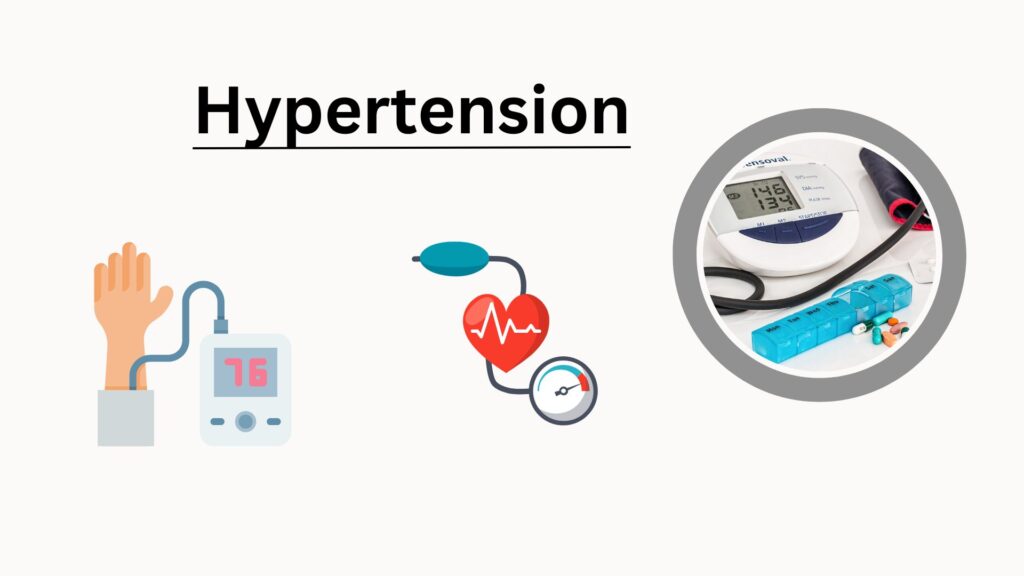Causes and Management of hypertension
Hypertension
Define hypertension : Persistent rise of blood pressure above the upper limit of normal level according to the age and sex of the patient.
We have described in article :
Causes of hypertension
Symptomsof hypertension
Signs of hypertension
Investigations of hypertension
Treatment of hypertension
Complication of hypertension

Causes of hypertension:
A) Primary or Essential hypertension:
- Genetic and familial factors.
- Socio-economic factors.
- Diatory factors: Obesity, high salt intake, caffeine.
- Lack of excretion and impaired intrauterine growth.
- Hormonal factors: High renin, reduced nitric oxide.
- Neurotransmitters: Acetylcholine, nor-Adrenaline.
B) Secondary hypertension:
- Vascular: Coarctation of aorta.
- Renal disease:
- Renal vascular disease.
- Parenchymal diseasae, particularly AGN, CGN.
- Polycystic Kidney disease.
- Dibetic nephropathy.
- Endocrine disease:
- Pheochromocytoma.
- Cushing’s syndrome.
- Conn’s syndrome.
- Hyperparathyroidism.
- Primary hypothyroidism.
- Drugs: a) Oral contraceptives containing oestrogen.b) Corticosteriods.c) NSAIDs.
- Alcohol.
- Obesity.
- Pregnancy:
- Pre-eclampsia.
- Eclampsia.
Symptoms of hypertension :
- Asymptomatic : Most of the cases symptoms appear after detection of hypertension.
- Symptoms of cardiological factors :
- Headache
- Vertigo
- Palpitation
- Polyurea
- Dizziness
- Pain in the back and neck
3. Symptoms due to complication :
- Anginal pain
- Breathlessness due to LVF
- Blurring of vision
4. Family history of hypertension.
5. Patient gives history of smoking.
6. Prior history of renal disease.
Signs of Hypertension :
- Pulse : Usually normal but may have high volume.
- Blood pressure : Raised
- Apex beat : It is heaving in character & displaced downwards and laterally.
- Heart sound : Aortic component of the 2nd heart sound is loud in aortic area.
- Added sound : Apical or aortic ejection systolic murmur.
- If bilateral basal crepitation : Possibly due to LVF.
Investigations of Hypertensions :
- Urine analysis for protein, glucose, RBC
- Blood urea, electrolytes and creatinine.
- Blood glucose to see diabetes mellitus.
- Serum total & HDL cholesterol.
- 12-lead ECG (To detect LVH and coronary artery disease).
- CXR : To detect cardiomegaly, heart failure, coarctation of aorta.
- Ambulatory BP recording: To assses borderline hypertension
- Echocardiogram to detect LVF.
- Renal ultrasound: to detect renal disease.
- Renal angiography: to detect renal artery stenosis.
Treatment of Hypertension :
A) General measure:
- Relief of stress and relaxation techniques
- Diet
- Reduce weight.
- Avoid excess salt consumption.
- Avoid alcohol consumption.
3. Regular physical exercise, like- walking, jogging.
- Avoid smoking
B) Antihypertensive drugs:
- Diuretics:
- Thiazide diuretics : Bendrofluazide 2.5mg daily or Cyclopenthiazide 0.5mg.
- Potassium sparing diuretics: Spirinolactone 50- 200mg daily.
- Loop diuretics: Frusemide 40mg daily is helpful in patient with renal and cardiac impairment.
- Beta-adrenoceptor antagonists (B- blocker):
a) Cardio-selective drugs (B1 antagonists):
- Atenolol 50-100mg daily. Or
- Bisoprolol 5-10mg daily.
b) Non-cadio selective drugs:
- Propranolol 40 – 120mg thrice daily orally.
- Pindolol 15-30mg daily.
c) Combined alpha & Beta adrenoceptor antagonists :
- Lebetalol 200mg 2.4g daily in divided doses
- Carvedilol 6.25-25mg 12 hourly.
- Angiotensin converting enzyme inhibitors (ACE-I):
- Captopril 25-75mg 12 hourly.
- Ramipril 5-10mg daily.
- Angiotensin-II recptor blockers: Similar effects as ACE-I
- Losartan 50-100mg daily.
- Valsartan 40-160mg daily
- Calcium antagonists:
- Amlodipine 5-10mg daily.
- Nifedipine 30-90mg daily.
- Hypertension in pregnancy: Methyldopa is safe 250mg 2-3 times daily.
Complication of hypertension:
A. Central nervous system:
- Stroke
- Hypertensive encephalopathy.
- Transient ischaemic attack (TIA).
- Subarachnoid haemorrhage.
- Carotid atheroma.
B. Retina:
- Hypertensive retinopathy.
C. Heart
- Left ventricular failure.
- Ischaemic heart disease (IHD).
- Atrial fibrillation.
D. Kidney:
1. Proteinuria.
2. Progressive renal failure.

Loving the info on this internet site, you have done great job on the posts.